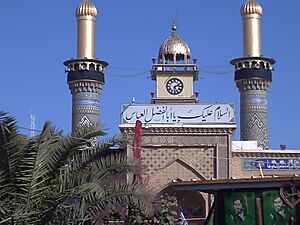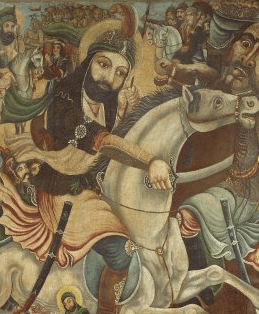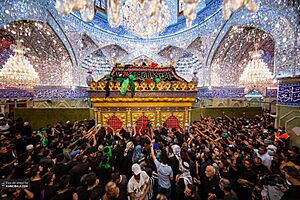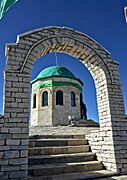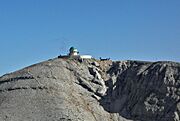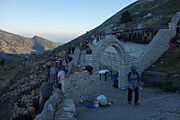Abbas ibn Ali facts for kids
Quick facts for kids
Abbas ibn Ali
|
|
|---|---|
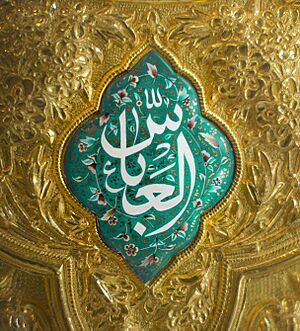
Abbas's name in Arabic calligraphy
|
|
| Born | c. 4 Shaban 26 AH c. 15 May 647 CE |
| Died | 10 Muharram 61 AH 10 October 680 (aged 33) |
| Cause of death | Killed in the Battle of Karbala |
| Resting place | Al-Abbas Shrine, Karbala, Iraq |
| Known for | Battle of Karbala |
| Title |
List of titles
Abu al-Fadl
(أَبُو ٱلْفَضْل) Qamar Bani Hashim (قَمَر بَنِي هَاشِم) (lit. moon of the Hashimites) al-Saqqa (ٱلسَّقَىٰ) (lit. the water carrier) Abu al-Qirba (أَبُو ٱلْقِرْبَة) (qirba means 'a water-skin') Alam-dar (علمدار) ('lit. standard-bearer) |
| Spouse(s) | Lubaba bint Ubayd Allah ibn al-Abbas ibn Abd al-Muttalib |
| Children |
|
| Parent(s) |
|
| Relatives | |
| Family | Ahl al-Bayt |
Abbas ibn Ali (born around May 15, 647 CE – died October 10, 680 CE) was a brave and loyal son of Ali ibn Abi Talib. Ali was a very important leader in early Islam, seen as the fourth Caliph by Sunni Muslims and the first Imam by Shia Muslims. Abbas's mother was Fatima bint Hizam, also known as Umm al-Banin, which means "mother of the sons."
Abbas is famous for his courage and self-sacrifice. He fought as the standard-bearer (the person who carries the flag) for his half-brother, Husayn ibn Ali, in the Battle of Karbala. This battle took place on October 10, 680 CE, against the army of the Umayyad caliph, Yazid I. Abbas was killed while bravely trying to bring water from the Euphrates river to Husayn's family, who were suffering from extreme thirst.
Shia Muslims see Abbas as a perfect example of bravery, loyalty, and giving everything for what you believe in. His shrine and Husayn's mausoleum in Karbala, Iraq, are very important places for pilgrims to visit.
Contents
Titles and Nicknames
Abbas had several special names and titles that showed his qualities:
- Abu al-Fadl: This means "father of virtue" or "father of excellence." It shows he was seen as a very good person.
- Qamar Bani Hashim: This means "moon of the Hashemites." It was given to him because he was known to be tall, handsome, and shining brightly like the moon among his family, the Hashemites.
- Alam-dar: This is a Persian word meaning "standard-bearer." He earned this title because he carried Husayn's flag in the Battle of Karbala.
- Al-Saqqa and Abu al-Qirba: Both these titles mean "the water carrier." He got them because of his heroic attempt to bring water to the thirsty camp during the Battle of Karbala.
Abbas was known for his boldness and bravery, just like his father, Ali. He was often called "the warrior-lion" or "the valiant lion" in Persian stories.
Early Life
Abbas was born in Medina to Ali and Fatima bint Hizam. He had three full brothers: Abd Allah, Ja'far, and Uthman. All of them were also killed in the Battle of Karbala. Their mother was known as Umm al-Banin, meaning "mother of the sons," because she had these brave sons.
There are different ideas about when Abbas was born. Some say he was born around May 15, 647 CE. Most of what we know about Abbas comes from stories about the Battle of Karbala, where he played a very important role.
The Battle of Karbala (680 CE)
A New Leader
After the death of Mu'awiya I, the caliph (leader) of the Umayyad empire, his son Yazid I became the new caliph in 680 CE. This was against an earlier agreement. Many people, including Husayn ibn Ali, did not want to accept Yazid as their leader because they felt he did not follow Islamic rules.
Yazid ordered the governor of Medina to force Husayn to accept him. To avoid this, Husayn left Medina and went to Mecca. Abbas and other family members went with him.
Journey to Karbala
People from the city of Kufa sent letters to Husayn, asking him to come and lead them against Yazid. Husayn decided to go to Kufa. He left Mecca with a small group of family and supporters. He said he was going to fight against injustice and do what was right.
However, on their way to Kufa, Husayn's group was stopped by Yazid's army. They were forced to camp in the desert land of Karbala on October 2, 680 CE. They were far from water and any protection. The people of Kufa who had promised to help Husayn did not come, as their new governor, Ubayd Allah ibn Ziyad, had stopped them.
Water Shortage
On October 7, Yazid's army cut off Husayn's group from the Euphrates river, their only source of water. Abbas and about fifty other companions bravely tried to get water in a night mission. They managed to bring some water back to the camp. Even with this, the camp suffered from thirst for three days in the hot desert climate of Karbala.
Negotiations and Refusal
Ibn Ziyad, the governor, told his commander, Umar ibn Sa'd, not to let Husayn leave unless he promised loyalty to Yazid. Husayn refused to give his loyalty but tried to negotiate to avoid fighting. However, Ibn Ziyad insisted that Husayn and his supporters must either pledge loyalty or be killed.
A Chance to Leave
The Umayyad commander Shimr ibn Dhi 'l-Jawshan offered Abbas and his three full brothers a safe passage because they were from the same tribe as him. But Abbas and his brothers refused this offer. They said they would rather have God's protection and pledged their full support to Husayn.
The Day Before the Battle (Tasu'a)
On October 9, the day before the main battle, Ibn Sa'd decided to attack. Husayn sent Abbas and some companions to ask for a delay until the next day. Husayn then told his followers that they could leave and not risk their lives for him. Abbas was the first to speak up, saying he would stay with his brother no matter what. Almost everyone stayed.
That night, Husayn and his companions spent their time praying and reading the Quran. It is said that Husayn's sister, Zaynab bint Ali, reminded Abbas of their father's wish for him to be Husayn's strong support, just as Ali was to Prophet Muhammad. Abbas promised to do so.
The Day of Battle (Ashura)
On the morning of October 10, Husayn organized his small group of about seventy-two men. He chose Abbas as his standard-bearer, showing how much he trusted him. Husayn spoke to the enemy, asking why they wanted to kill the grandson of Prophet Muhammad. During this time, one of the Umayyad commanders, Al-Hurr ibn Yazid Al-Tamimi, switched sides and joined Husayn.
The battle began with arrows raining down on Husayn's camp. It lasted all day, with many small fights. Abbas bravely helped rescue some companions who were surrounded by enemy horsemen. By the afternoon, all of Husayn's companions and family members had fallen.
Abbas's Death
One well-known story says that Abbas, seeing the children's thirst, rode towards the Euphrates river to get water. He managed to fill his water-skin, but he was attacked by the enemy near the river bank, far from Husayn's camp. Fighting alone, he was killed. It is said that Husayn wept deeply when his brother fell.
Abbas's burial place is separate from Husayn's and his other companions. This supports the story that he was killed away from the main camp while trying to get water. He later became known as "the water carrier" because of this brave act.
Shrine
Abbas was buried by people from a nearby village at the same spot where he was killed. Later, a tomb was built over his grave. Today, Abbas's shrine has a golden dome and is located near Husayn's mausoleum in Karbala. Both shrines are important pilgrimage sites and centers for religious learning.
Descendants
Abbas had a young son named Ubayd Allah. Abbas's family line continued through this son. Some of Abbas's descendants became famous poets and scholars in later centuries.
Importance in Shia Islam
In Shia Islam, Abbas is seen as the ultimate example of courage, chivalry, love, and self-sacrifice. Shia Muslims often pray to God through Abbas, asking him to join his prayers with theirs. Abbas is believed to help in easing sadness and suffering. Serious promises are sometimes made in his name, and people often give food for charity as part of vows made in his name.
Muharram Rituals
The ninth day of Muharram (called Tasu'a) is a special day of mourning for Abbas in Shia Islam. He is honored in religious plays called ta'zies, where he is shown as the water carrier and standard-bearer of Husayn. These plays about Abbas's death are very old and are performed often.
During Muharram processions, green flags are carried. These flags often have a metal hand on top, representing Abbas's hand that was cut off. The fingers on the hand symbolize the Ahl al-Bayt (Prophet Muhammad's family). People also give out food and water for charity in his name.
Religious Art
Abbas is a very common figure in Shia art. Poems about him and his image are often found in religious buildings, especially on tiles in public drinking-water places, and centers for commemorating Husayn. In religious paintings, Abbas is often shown riding a white horse, holding Husayn's banner, or carrying a water-skin surrounded by women and children of the Ahl al-Bayt.
Importance in Bektashism
The Bektashi Order, a Sufi group mainly in Albania, has a special tradition about Abbas. They believe that Abbas ibn Ali (called Abaz Aliu) came to Albania on a white horse to save it. They also believe he returns to Mount Tomorr in Albania for five days each year (August 20–25). During this time, Bektashi pilgrims visit the Abbas Ali Türbe, a mausoleum believed to hold Abbas's remains, located on Mount Tomorr.
See also
 | William L. Dawson |
 | W. E. B. Du Bois |
 | Harry Belafonte |


